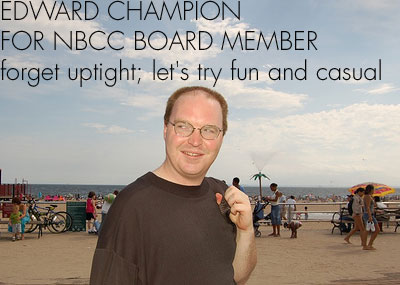Even though there has yet to be an official announcement, the NBCC is once again unofficially “reporting” “unofficial” and unsourced news that Washington Post Book World will print its last issue on February 15, 2009. Efforts to reach Marcus Brauchli to clarify answers have been unsuccessful (the man does not want to talk, even though it is claimed that he’s the only one who can answer), but perhaps a clue to Washington Post Book World‘s possible demise might be found in this blog entry at Short Stack, whereby specific links to “hard times” and “good news” suggest a tenable connection.
Conjecture, however, is hardly journalism. It still strikes me as journalistically irresponsible to report unconfirmed and unofficial rumors, particularly after Maureen McLane’s embarrassing array of bread pudding posts over the weekend. While this approach may work for Harry Knowles or Perez Hilton, it’s a bit dismaying but not particularly surprising to see that it likewise works for Jane Ciabattari.
[UPDATE: Thankfully, Motoko Rich has done some reporting, getting some interesting quotes from David Ulin, Steve Wasserman, and Douglas Brinkley, and talking with sources inside the paper. As Ulin notes, the death of a Sunday stand-alone section does not necessarily translate into an end for robust book coverage. It apparently hasn’t occurred to some of the NBCC’s inflexible fulminators that merging books coverage into general cultural sections may actually get more people reading books coverage. Is not such an approach better for the long-term health of literary journalism? And does it not attract a broader readership who otherwise may not have known about a specific book or author?]
[UPDATE 2: Terry Teachout also has thoughts, adding, “Why tear your hair because the Washington Post has decided to bow to the inevitable? The point is that the Post is still covering books, and the paper’s decision to continue to publish an online version of Book World strikes me as enlightened, so long as the online “magazine” is edited and designed in such a way as to retain a visual and stylistic identity of its own.”]
[UPDATE 3: Sarah Weinman notes, “Instead of passive intake, this is a world of active consumption and discussion, where people seek out what they want, when they want it at their own discretion. Looking for guidance and seeking things out aren’t mutually exclusive, but readers should be – and are – suspicious of entitlement and suspicion that comes with books coverage being wholly separate from the larger world.”]
[UPDATE 4: To jump off from Terry and Sarah’s thoughts, one advantage that a print-based newspaper has over a blog is the manner in which a reader can discover an article adjacent to another, much like the way in which you discover an unexpected book next to another in a library or a bookstore. Given this exploratory reading tendency, does it even make sense for any newspaper today to maintain a stand-alone books section? I’m wondering if the time has come for newspapers to stop segregating books coverage. A naturally curious reader, interested in the many pressing issues of her day, might very well find a newspaper book review to be of value. Hell, the reader may not even know that the newspaper features books coverage. Maybe the time has come for newspapers to stop considering how a newspaper’s house style dictates the tone, and think more about how individual voices bring life, passion, and informed arguments to a newspaper. The gatekeeper may no longer be the outlet; it may very well be the individual reporter herself. Authority may now arise from an individual’s reputation and voice, rather than the trappings of institutional newspaper culture. And given how rigid, gaffe-ridden, and humorless many of these institutions are, this development may not necessarily be a bad thing.]
[UPDATE 5: A contrarian print-partisan take from Lizzie Skurnick, whose mind is in the toilet.]
[UPDATE 6: The Post itself offers a report, with quotes from Brauchli. According to Rachel Shea, three quarters of the roughly 900 reviews each year will be shifted over to the Style section. Shea herself invites comments from readers.
Carolyn Kellogg: “A lot of effort has gone into bemoaning book review changes and it’s hard for me not to think that, coming from book critics, it’s both self-serving and a little cheesy. And it’s certainly less interesting than engaging with books.” Meanwhile, Scott Esposito calls out newspapers for not getting “with the 21st century and [figuring] out how to sell bookpage adspace to entities other than publishers and bookstores.”
Orthofer: “[M]an, do we miss paper coverage.” And to address the print sentiments of Elizabeth Foxwell and Joe Flood, it’s worth observing again that there will still be a print section that you can curl up to. It’s just going to be merged into the rest of the newspaper. Flood observes that the review was “printed on the cheapest paper available – the CVS coupons are on much better stock.” Maybe the time has come for newspapers to adopt POD as a viable curling up option.]
[UPDATE 7: I’ve located an article from 1973 depicting the then closing of Book World. The pertinent parallels and details can be found here.]
